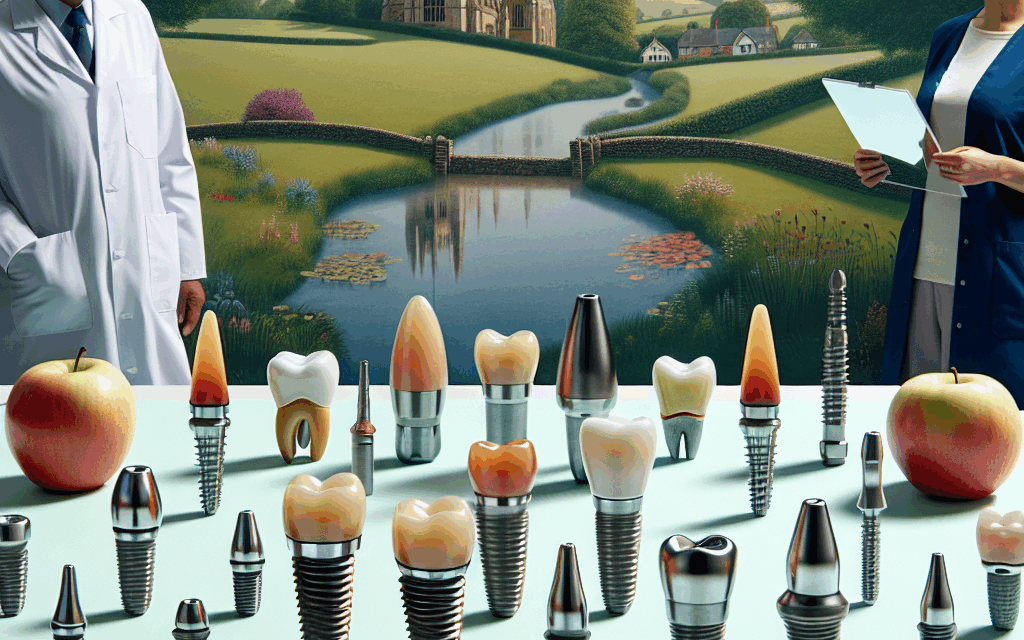Exploring Dental Implant Options in Buckinghamshire
Dental implants have revolutionized the field of dentistry, providing a long-lasting solution for tooth loss. In Buckinghamshire, a region known for its rich history and beautiful landscapes, residents have access to a variety of dental implant options. This article delves into the different types of dental implants available, the procedure involved, the benefits and risks, costs, and the importance of choosing the right dental professional. By the end of this comprehensive guide, readers will have a thorough understanding of dental implant options in Buckinghamshire.
1. Understanding Dental Implants
Dental implants are artificial tooth roots made of biocompatible materials, typically titanium, that are surgically placed into the jawbone. They serve as a sturdy foundation for replacement teeth, which can be crowns, bridges, or dentures. The process of getting dental implants involves several stages, including consultation, surgery, and recovery.
1.1 Types of Dental Implants
There are several types of dental implants available, each designed to meet specific needs:
- Endosteal Implants: These are the most common type of dental implants, placed directly into the jawbone. They can hold one or more prosthetic teeth and are typically made of titanium.
- Subperiosteal Implants: These implants are placed under the gum but above the jawbone. They are used for patients who do not have enough healthy jawbone for endosteal implants.
- Zygomatic Implants: A less common option, zygomatic implants are anchored in the cheekbone (zygomatic bone) and are used for patients with severe bone loss in the upper jaw.
- Mini Dental Implants: These are smaller in diameter than traditional implants and are often used in situations where there is limited space or bone density.
- All-on-4 Implants: This technique involves placing four implants in the jaw to support a full arch of teeth, making it a popular choice for those needing complete dentures.
1.2 The Implant Procedure
The dental implant procedure typically involves several steps:
- Initial Consultation: A thorough examination, including X-rays and possibly 3D imaging, is conducted to assess the jawbone and determine the best implant type.
- Surgery: The implant is surgically placed into the jawbone. This may require local anesthesia or sedation.
- Osseointegration: Over the next few months, the implant fuses with the jawbone, providing a stable foundation for the prosthetic tooth.
- Abutment Placement: Once healed, an abutment is attached to the implant to hold the crown or bridge.
- Final Restoration: The final prosthetic tooth or teeth are placed, completing the process.
2. Benefits of Dental Implants
Dental implants offer numerous advantages over traditional dentures and bridges. Understanding these benefits can help patients make informed decisions about their dental health.
2.1 Improved Aesthetics
One of the most significant benefits of dental implants is their natural appearance. Unlike dentures, which can slip or look artificial, implants are designed to look and feel like natural teeth. This can greatly enhance a person’s confidence and self-esteem.
2.2 Enhanced Functionality
Dental implants function like natural teeth, allowing patients to eat, speak, and smile without discomfort. They restore full chewing power, enabling individuals to enjoy a wider variety of foods without fear of their teeth slipping or causing pain.
2.3 Longevity and Durability
With proper care, dental implants can last a lifetime. Unlike bridges, which may need to be replaced every 5-10 years, implants are a long-term solution that can withstand the test of time.
2.4 Bone Preservation
Dental implants help preserve jawbone density. When a tooth is lost, the jawbone can begin to deteriorate. Implants stimulate the bone, preventing further loss and maintaining facial structure.
2.5 Convenience and Comfort
Unlike removable dentures, which require adhesives and can be uncomfortable, dental implants are fixed in place. This means no more worrying about slippage or discomfort, making daily life much easier.
3. Risks and Considerations
While dental implants offer many benefits, they are not without risks. Understanding these potential complications is crucial for anyone considering the procedure.
3.1 Surgical Risks
As with any surgical procedure, there are risks involved with dental implant surgery. These can include:
- Infection: There is a risk of infection at the implant site, which can complicate healing.
- Nerve Damage: Improper placement of the implant can lead to nerve damage, resulting in pain or numbness.
- Sinus Issues: For upper jaw implants, there is a risk of sinus perforation.
3.2 Bone Quality and Quantity
Successful dental implant placement requires sufficient bone density. Patients with significant bone loss may need bone grafting before implants can be placed, adding to the complexity and cost of the procedure.
3.3 Cost Considerations
Dental implants can be more expensive than other tooth replacement options. Patients should consider their budget and explore financing options if necessary. The cost can vary based on:
- The type of implant used
- The complexity of the case
- Additional procedures like bone grafting
3.4 Maintenance and Care
While dental implants are durable, they still require proper care. Patients must maintain good oral hygiene and attend regular dental check-ups to ensure the longevity of their implants.
3.5 Psychological Factors
Some patients may experience anxiety about the surgical procedure or the outcome. It’s essential to discuss these concerns with a dental professional who can provide reassurance and support.
4. Cost of Dental Implants in Buckinghamshire
The cost of dental implants can vary significantly based on several factors, including the type of implant, the complexity of the case, and the dental practice’s location. In Buckinghamshire, patients can expect a range of prices for dental implants.
4.1 Average Costs
On average, the cost of a single dental implant in Buckinghamshire can range from £2,000 to £3,500. This price typically includes:
- The initial consultation and diagnostic imaging
- The surgical placement of the implant
- The abutment and crown placement
4.2 Additional Costs
Patients should also consider potential additional costs, such as:
- Bone Grafting: If bone loss is present, bone grafting can add £500 to £1,500 to the total cost.
- Sinus Lift: This procedure may be necessary for upper jaw implants and can cost an additional £1,000 to £2,000.
- Follow-up Visits: Regular check-ups and maintenance may incur additional fees.
4.3 Insurance and Financing Options
Many dental insurance plans do not cover the full cost of dental implants, but some may cover a portion. Patients should check with their insurance provider to understand their coverage. Additionally, many dental practices offer financing options to help spread the cost over time.
4.4 Comparing Costs
When considering dental implants, it’s essential to compare costs among different dental practices in Buckinghamshire. Patients should not only look at the price but also consider the experience and qualifications of the dental professionals.
4.5 Value of Investment
While dental implants may seem costly upfront, they can be a valuable investment in long-term oral health. Their durability and functionality often outweigh the initial expense, making them a worthwhile consideration for those with missing teeth.
5. Choosing the Right Dental Professional
Selecting the right dental professional for implant surgery is crucial for a successful outcome. Patients in Buckinghamshire have various options, but it’s essential to choose wisely.
5.1 Qualifications and Experience
When searching for a dental professional, consider their qualifications and experience in implant dentistry. Look for:
- Specialization: Dentists who specialize in implantology or have additional training in this area.
- Experience: A practitioner with a proven track record of successful implant placements.
- Memberships: Affiliations with professional organizations, such as the Association of Dental Implantology (ADI).
5.2 Patient Reviews and Testimonials
Reading patient reviews and testimonials can provide insight into the quality of care provided by a dental practice. Look for feedback on:
- The professionalism of the staff
- The comfort of the office environment
- The overall patient experience
5.3 Consultation Process
A thorough consultation is essential before undergoing implant surgery. During this visit, patients should:
- Discuss their medical history and any concerns
- Ask about the implant procedure and what to expect
- Inquire about post-operative care and follow-up visits
5.4 Technology and Techniques
Modern dental practices often utilize advanced technology and techniques for implant placement. Look for practices that offer:
- 3D Imaging: This technology provides detailed images of the jawbone, aiding in precise implant placement.
- Guided Surgery: Computer-guided surgery can enhance accuracy and reduce recovery time.
5.5 Comfort and Communication
Finally, it’s essential to choose a dental professional who makes you feel comfortable and communicates effectively. A good dentist will take the time to answer questions and address concerns, ensuring that patients feel informed and confident in their treatment plan.
Conclusion
Dental implants offer a transformative solution for individuals dealing with tooth loss, providing benefits that extend beyond aesthetics. In Buckinghamshire, patients have access to a variety of implant options, each designed to meet specific needs. While the procedure comes with risks and costs, the long-term advantages often outweigh these concerns.
By understanding the types of implants available, the benefits and risks associated with the procedure, and the importance of choosing the right dental professional, individuals can make informed decisions about their oral health. As dental technology continues to advance, the future of dental implants looks promising, offering hope and improved quality of life for many.
In summary, whether you are considering dental implants for the first time or seeking to replace an existing restoration, thorough research and consultation with qualified professionals in Buckinghamshire will ensure you receive the best possible care and outcomes.





